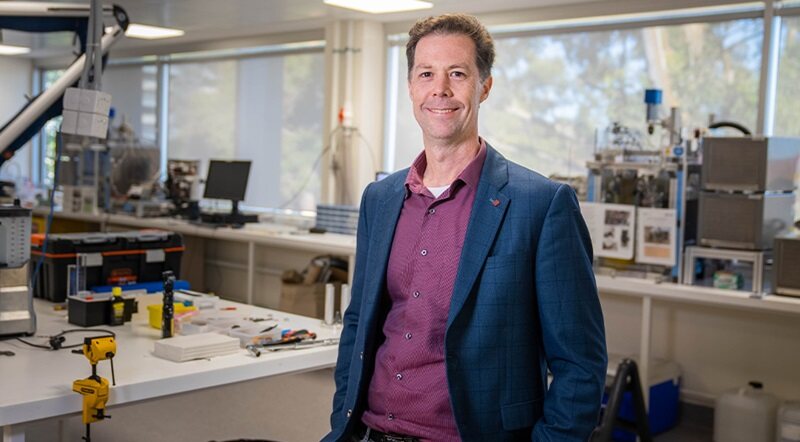A researcher from The University of Western Australia whose work has paved the way for cleaner, sustainable energy production to meet the need of future generations, has been awarded WA Scientist of the Year in the 2021 Premier’s Science Awards.


Professor Eric May, from UWA’s School of Engineering, Computing and Mathematics, is an internationally recognised leader in the areas of fluid science, thermodynamics, metrology and natural gas engineering.
His understanding of the behaviour of gases and liquids and development and use of ground-breaking measurement technology have helped reduce the cost and environmental impact of liquefied natural gas production. Other real-world outcomes of his research include decreasing greenhouse gas emissions from coal mines and optimising air conditioning cycles based on new, environmentally-friendly refrigerants.
Professor May is also the Chevron Chair in Gas Processing Engineering and an Australian Research Council fellow who leads the Future Energy Exports Cooperative Research Centre. He described the award as “great recognition” for his team.
“Awards like WA Scientist of the Year are important because they inspire young people at the beginning of their careers to pathways that will help them reach their full potential. Getting that new talent into the pipeline builds on the work we are doing and will help us reach the targets we’re aiming for,” Professor May said.
Four other UWA scientists were recognised at the awards, including Associate Professor Edward Litton from the UWA Medical School and Dr Arman Siavashi, a Forrest and Fulbright Postdoctoral Fellow from the Australian Centre for LNG Futures, who were joint winners of the Woodside Early Career Scientist of the Year.
Intensive care specialist Associate Professor Litton’s goal is to improve the outcomes for critically ill patients requiring intensive care treatment. His recent work has been related to COVID-19 and includes implementing a large international clinical trial looking at effective treatments for severe cases.
Chemical engineer Dr Siahvashi’s is developing cutting-edge technologies to reduce costs and eliminate safety hazards associated with clean energy production such as liquid hydrogen, work which has led to collaborations with NASA and Jet Propulsion Laboratory on liquid hydrogen as a rocket fuel.
Niamh Troy, a PhD candidate at the UWA-affiliated Telethon Kids Institute, was joint winner of the ExxonMobil Student Scientist of the Year. Her research, carried out at the Wal-yan Respiratory Research Centre is in bioinformatics to better understand the immune response to respiratory viral infections in asthma and how we can use bacterial therapeutics to harness the innate immune system to protect against severe lung infections in infants.
Internationally recognised ecologist, Emeritus Professor Richard Hobbs, a former WA Scientist of the Year (2011), was inducted into the Western Australian Science Hall of Fame at last night’s ceremony.
A highly cited researcher from UWA’s School of Biological Sciences who also heads up the Ecosystem Restoration and Intervention Ecology Research Group (ERIE), his specific interests include vegetation dynamics and management, fragmentation, invasive species ecosystem restoration, conservation biology and landscape ecology.
UWA’s Vice-Chancellor Professor Amit Chakma praised the work of the researchers for their incredible contribution.
“The new knowledge created by UWA’s award winning scientists has led to solutions to the many global challenges faced by humanity, expanding our understanding of ourselves and the world around us,” Professor Chakma said.
“UWA’s winning scientists, and indeed all those nominated in the Premier’s Science Awards, have contributed to major scientific advancements, and we hope their work will continue to inspire the next generation of researchers.
“I extend my heartfelt congratulations to Professor May, Associate Professor Litton, Dr Siavashi, Ms Troy, and Emeritus Professor Hobbs,” he said.
The awards, a State Government initiative, were established in 2002 to honour the outstanding achievements of WA’s science and innovation community.



































